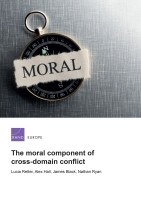| 来源类型 | Research Reports
|
| 规范类型 | 报告
|
| DOI | https://doi.org/10.7249/RR1505
|
| 来源ID | RR-1505-MOD
|
| The moral component of cross-domain conflict |
| Lucia Retter; Alexandra Hall; James Black; Nathan Ryan
|
| 发表日期 | 2016
|
| 出版年 | 2016
|
| 页码 | 78
|
| 语种 | 英语
|
| 结论 |
Existing moral frameworks have not outlived their usefulness. - The majority view among academic experts was that existing moral frameworks and principles continue to apply. That said, some advocate for a new interpretation of existing principles or amendment to or a confirmation of underpinning definitions.
There is a considerable disparity in the legal interpretations of the terms 'armed attack' and 'harm'.- Significant disparity exists in the legal interpretations applied to the term 'armed attack' (which is critical in determining the legality of a resort to force) and in deliberations regarding what constitutes (sufficient) 'harm' (including both physical and non-physical effects). This is particularly contentious in relation to cyber.
There was general consensus among those consulted that there appears no moral obligation to respond 'in kind'.- Theorists generally agree that there is no particular moral barrier to responding to a non-kinetic attack — once confirmed as constituting an 'armed attack' — with kinetic force if this is considered the most appropriate course of action under the specific circumstances.
Under a revisionist line of thinking, the legal definition of combatants does not sufficiently account for moral intentions of individuals involved in conflict. - Revisionist approaches to just war theory challenge the legal distinction between combatants and non-combatants since they do not account for the moral intentions of individuals party to a conflict. Under this line of thinking, non-combatants may render themselves liable to harm if their actions infer their support for an 'unjust war'.
|
| 摘要 |
- A greater emphasis on policy development in relation to cyber and to autonomous systems would help focus on the specific morality issues associated with the UK's likely use of these capabilities in the future.
- Reflecting the shift away from state agency to a focus on individuals as moral actors, MOD should take steps to ensure that morality is embedded in every individual service member, supported by an organisational 'moral culture'. For instance, MOD should ensure that training techniques used to embed moral and lawful conduct in service personnel explore the specificities of the new challenges.
- Examination of potential changes in the future moral operating landscape could be integrated into wider horizon-scanning and strategic force development work to assess defence planning against moral assumptions and to generate a more robust evidence base to inform decision-making.
|
| 主题 | Cyber Warfare
; International Humanitarian Law
; Law of War
; Military Doctrine
; Military Strategy
; Unmanned Aerial Vehicles
|
| URL | https://www.rand.org/pubs/research_reports/RR1505.html
|
| 来源智库 | RAND Corporation (United States)
|
| 引用统计 |
|
| 资源类型 | 智库出版物
|
| 条目标识符 | http://119.78.100.153/handle/2XGU8XDN/108273
|
推荐引用方式
GB/T 7714 |
Lucia Retter,Alexandra Hall,James Black,et al. The moral component of cross-domain conflict. 2016.
|
|
文件名:
|
x1495316245076.jpg
|
|
格式:
|
JPEG
|

|
文件名:
|
RAND_RR1505.pdf
|
|
格式:
|
Adobe PDF
|
除非特别说明,本系统中所有内容都受版权保护,并保留所有权利。